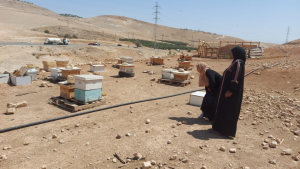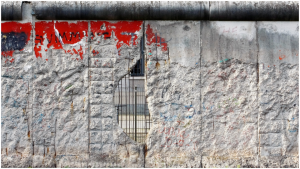BEES FOR PEACE- TRAILER – דבורים לשלום – نحل من أجل السلام
BEES FOR PEACE- Trailer דבורים לשלום نحل من أجل السلام filmmaker Ran Levy-Yammori takes us on a powerful journey through seven remarkable communities of women across Israel who are building bridges-through beekeeping.
Hands Dipped in Honey: A new documentary on bees and co-existence
Written by Aviv Lavie (Zman Israel – Hebrew version)
Photos by Gil Wolfson
Suleimani is one of several impressive women who appear in a new film “Bees for Peace,” directed and produced by Ran Levy-Yamamori, who specializes in nature documentaries. In these times, the film, like the project it documents, amounts to a statement bordering on subversion. Against the background of the turbulent, polarized political atmosphere, the “honey women” – Arab and Jewish women who study together and cooperate in cultivating beehives and producing honey in natural ways – are a miraculous exception.
The celebratory premiere of the film, which took place on May 26 at Dizengoff Center, a mall in Tel Aviv, was also unconventional. In the foyer of Hall No. 1 of the Lev Cinema, the tables were loaded with Arab and Jewish delicacies, which the film’s participants had prepared. Dan Piltz, the CEO and one of the owners of Dizengoff Center, moved excitedly among the guests. There are probably not many shopping malls that have beehives on their roofs and are deeply involved in a social-ecological honey project. Optimism pervaded the hall, and only a few days later the1reator, Levy-Yamamori, told Zman Israel that he feared someone would try to sabotage the event.
Aren’t you exaggerating? After all, this is not a demonstration against the war.
“I also thought I was exaggerating until several schools told me that they had stopped buying ecology books that I had written for children, because alongside the Hebrew text there is an Arabic text and there are families who are not ready to bring Arabic into their home.”
Like everything related to bees in Israel today, this project started with Yossi Aud. Calling him ‘Israel’s Mr. Bees’ is an understatement. He founded ‘The Red Shield of Bees (Magen Dvorim Adom)’, whose volunteers currently save about 3000 bee swarms each year. At the beginning of the film, Aud recalls how he was out in the garden when a single swarm, consisting of thousands of bees, suddenly appeared, an event that made him fall in love with bees and abandon a prosperous management career. “People always ask me how I came to bees,” says Aud, “but the truth is that they came to me.”
What started with curiosity and passion, as befits a hobby, turned into a worldview and a mission. Instead of learning about the bees, he learnt from them: the absolute harmony they maintain among themselves and between themselves and the world, he says – a harmony that begins with them doing perfectly coordinated tasks in the hive – is the way humans should also act: “The result of this harmony is abundance, products that are all about health and healing. If we knew how to imitate this, the reality around us would look completely different.”

The women of “Bees for Peace” go through a course, at the end of which they receive a beehive or two to take home. Several of them say that the beehive becomes a family and neighborhood attraction, placing the woman and the bee at the center. Suddenly the woman is the hero of the house. Others tell how they were drawn into the magic of the world of bees and honey, a magic that adds color and interest to a gray daily routine. And there are those for whom the beehive has a meditative value: “All my life my head has been buzzing non-stop,” said one of the honey-women on the eve of the screening. “My husband suggested that I take up meditation, but it seems that only when I sit and watch the bees does the buzzing in my head calm down”.
Wafa Tiara, coordinator of the women’s program at the MAAN Workers Association, explains that this is an excellent way to reduce women’s unemployment in Arab society. A woman who undergoes training in beehive care and honey production can increase household income and take part in regional Eco-tourism ventures, like the women who live in the settlements near Nahal Tzipori in the Galilee. For Michelle Ann, a reflexologist, the bees are a means of connecting with the nature that surrounds her city of Harish. Fatma Hasan Yassin, a painter from Umm al-Fahm, sees dealing with bees as a means of expression, and for Efrat Gabbai of Nahalal it is a way to deal with fears – she never imagined that she would dare to surround herself with bees.
All these women went through a beekeeping course using the biodynamic method. Yossi Aud’s premise is that the honey industry is just as exploitative as the other food industries, putting financial profit over the welfare of the bees and concern for the environment. In a biodynamic beehive there are no pesticides, no antibiotics, the bees are not drenched in sugar water, and no manipulation is done to increase the amount of honey they produce. The honey is a welcome byproduct but not the goal. At the bottom line, says Aud, biodynamic breeding is the answer to the disappearance of the bees, which is a global danger to agriculture and, in fact, to human existence. A network of domestic beekeepers, already deployed in many localities from the Upper Galilee to the Negev, could be the “iron dome” of bees in Israel.

The women’s stories do not miss the small, smiling details, such as the fear of being stung. There are some who have been stung here and there (sometimes they upload a picture of their swollen faces in WhatsApp groups), but the majority have already lost their fear and are taking care of the hives with their bare hands. They leave the anxieties to the men. Among the husbands there are some who refuse to approach the hive, while others try to convince the women to look for a more conventional hobby.
Above all hovers, of course, the Gaza war, and with it the question of whether the honey will be able to bridge the gaps, concerns and prejudices. Michelle Ann of Harish, remembers how in the first weeks of the war she was the only Jew in the bee course, which was given by Sindyanna of Galilee and MAAN, yet she received a warm welcome and very quickly felt at home. After October 7, women who were evacuated from Kibbutz Admit on Israel’s northern border and from the nearby village of Arab al Aramsheh, which had been shelled, talked about the difficulty of abandoning the hives under fire. The final scene of the film records their return to Admit, where the swarm is discovered alive and buzzing. One by one, Jew after Arab, the women tell about honey as a factor that connects people and opens hearts. “This stickiness creates closeness”, concluded a workshop where everyone’s hands were dipped in honey most of the time.
When the curtain closed on the first screening, honey-women from all over the country took the stage. They gave Levi-Yamamori a gift – a jar of honey, of course – as a token of thanks for the voice and presence that he and the camera had given them. The excited director waved the honey as if he had just won an Oscar. Still echoing was a statement from the film by Sheikh Khaled Issa Akavi, the imam of a mosque in western Galilee, who reported that his divorced daughter had found solace in cultivating a beehive. “You see her smile at the honey,” he said to the camera. “We’re all tired of the wars, we’re all looking for peace, but it won’t come by itself. You have to learn how to produce it, how to build it. Like honey.”
Translation: Roni Ben Efrat – Bees for Peace/ Sindyanna of Galilee










